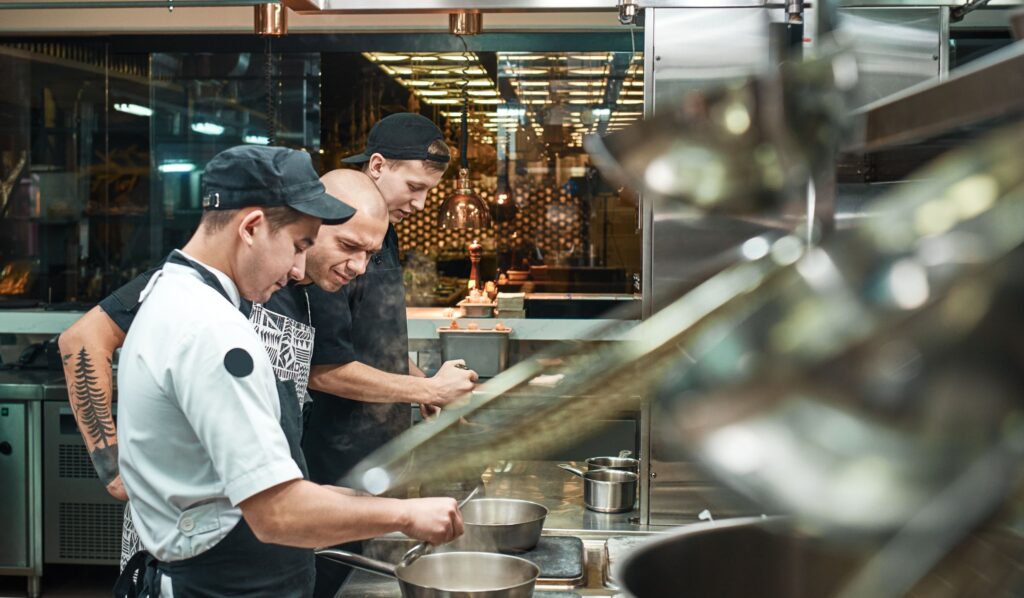Rock-solid restaurant staff management is the cornerstone of any successful restaurant. While every job, from dishwasher to sous chef, has a critical role, all of them interact with the responsibilities of a restaurant manager who has the distinct opportunity to set the business on a course toward sustained growth and ever-improving guest experiences.
A critical element of that opportunity is how the restaurant manager leads and interacts with their staff. This is the case for the entire employee lifecycle, from the first moments when a prospect is interviewed until later when hopefully a high-performing team member has the opportunity to step into a leadership role.
What makes a good restaurant staff manager?
Ideally, a manager who will lead your restaurant team through the challenges and successes of every shift, week, quarter, and year, will be someone with the following characteristics:
Leadership
Effective leaders are more than just dishing out orders and waiting for the results. A true leader leads. In the case of a restaurant, that means a manager who’s as comfortable taking a hands-off approach when things are running smoothly as taking guests’ orders and bussing tables when the team is down a few sets of hands. A solid restaurant manager leads the team to surpass expectations when they’re already performing well and helps navigate back toward success when things go awry.
Communication
In the pressure cooker that is modern restaurants, it’s both what you say and how you say it. Today effectively managing restaurant staff knows how to communicate urgency and high expectations while maintaining professionalism, care, and empathy for hardworking teams.
Organization
Managing restaurant staff also requires a high level of organization and constant multitasking. Leaders need to manage orders, inventory, the relationship between front-of-house and back-of-house, guests, and everything else that could come up over the course of a given day.
Flexibility
Restaurants are the perfect proving ground for Murphy’s Law. After the past few years, it seems that everything that could go wrong did. First was the pandemic, followed by a global supply chain shortage, runaway inflation, and a staffing crisis. Managing restaurant staff demands flexibility and resiliency in the face of any change or challenge.
Emotional intelligence
No two situations are the same: dissatisfied customers, feuding cooks, or your two best servers vying for the same shifts. Managing restaurant staff requires managers have the emotional intelligence to assess every situation and determine the best course of action for the organization based on the personalities of those involved. Ultimately, the goal is to ensure the restaurant engine — improving profits and guest experiences — not only continues to hum along but becomes stronger as it goes.
Tech-savvy
Today, even the restaurant industry, which demands physical labor to prepare and serve food over and over again, can be bolstered by technology. Whether that’s cloud-based inventory to give managers and teams the ability to count faster and more accurately; tech-driven scheduling to help managers cover the floor while controlling labor costs; or data analysis to help make each dish and the restaurant’s entire menu as profitable as possible, managers need to be at least familiar and eager to embrace the industry’s game-changing technology.
Manage restaurant staff better by ensuring staff feels valued
On the heels of the great resignation and the drastic upheaval across all industries, now is more than ever the time to ensure staff feel valued and supported. As the labor market has tightened with record levels of job openings and rising wages, turnover, which was always costly, is now even riskier. With restaurants operating on tight budgets and even tighter margins, managing restaurant staff with a focus on retention and development is vital. Here is where managers with traits like leadership, emotional intelligence, and flexibility shine.
How to Make Restaurant Staff Feel Valued:
- Displaying a positive attitude in the face of any challenge.
- Leading with as much transparency as possible.
- Being tough and detailed oriented but sensitive, especially when making difficult requests, and showing appreciation as often as is warranted.
Flexible, profitable restaurant employee management
A critical part of restaurant and restaurant management is ensuring that the team is in-house to do all prep work, adequately meet the needs of any and every service, and maintain the restaurant so it performs well the following day. The unspoken element of that is choreographing employee schedules so no teammate feels slighted, especially considering restaurant workers often put in hours when most of the world is on vacation.
A tech-driven solution is the answer to the last challenge. By empowering employees to request the days on or off, communicate with managers, and potentially swap shifts, digital, cloud-based scheduling tools ensure the business’ broader needs are met.
That same tool is also invaluable for managing restaurant staff. Labor is the second largest expense for any restaurant. Often, managers rely on a combination of previous schedules, institutional knowledge, and what’s feasible to create upcoming schedules. With an integrated Restaurant Enterprise Management platform, managers have complete access to previous sales and forecasts and budgets for future sales so they can schedule the precise amount of staff to meet the need. Additionally, the ability to access real-time sales information empowers managers to adjust staffing levels on the fly generating incremental savings that can add up to significant sums over a year.
Maximizing Your Restaurant Marketing
How to drive restaurant customer loyalty
Everyone knows excellent food, service, and a welcoming environment are essential to a successful restaurant. But what about the oft-overlooked fourth pillar: building brand loyalty and diversifying your customer base while taking extraordinary care of your regulars?
While this is less simple to measure, it’s a critical function that will meaningfully impact the long-term success of your overall restaurant company, regardless of the economy.
Building and maintaining this fourth pillar must happen as soon as possible. Effective restaurant management isn’t a sprint; it’s a marathon. Establishing and communicating your company culture, training and retraining your team, monitoring their performance, and seeking guest feedback will pay off no matter what else happens in the broader economy.
Explore every restaurant marketing channel
There’s no denying the value of social media and social media marketing. However, defining a strategy, tactics, and return on investment for this channel is more complicated and often prevents operators from getting the maximum value from these channels.
Think about it this way: Perhaps challenging times are creeping in, you’re seeing throughput decline, and you want to start an extended happy to attract more guests. Things might be going well, you have additional resources to test a few new menu items, and you’re launching a collection of exciting new menu items. If you haven’t built the audience to receive those messages, no one will see them, and you’ll receive little help no matter the economic climate.
Social media doesn’t require a dedicated individual, team, or outside agency. It requires consistency and engagement. This is where your restaurant staff has the opportunity to share your food, culture, and vibe directly with those you want to reach.
At the same time, you’ll want to explore low-cost marketing and SEO for your online presence. Free tools are abundant for the latter, and while the overall process might feel overwhelming, what’s most important is to start today so you and your team are familiar with these tools and have an established strategy that you can pursue as you grow or need.
Just as it’s key to share your unique culture and food with as large an audience as possible, it’s also important to explore every possible revenue-generating channel.
Explore every restaurant delivery option
The pandemic led to a boom in delivery and takeaway service, and while those channels’ numbers aren’t what they once were, they’re still higher than they’ve historically been. Consulting firm Frost & Sullivan estimates that the food delivery industry will be worth $200 billion by 2025, up from the $82 billion it estimated in 2018. While indoor dining headcounts have recovered from the pandemic — the 13 million guests seated by Yelp reservations in Q1 2022 was a 48% increase over the same period in 2021 – changes in the industry show that growth-minded owners and operators need to establish contingency plans for any situation.
Train your team up so you can test all service models, delivery and takeaway platforms, and commissary-driven locations that could all be important revenue drivers. Consumers always subconsciously think, “don’t make it hard for me to spend money.” Be ready and there for them, wherever they happen to be.
Become a better restaurant staff manager
A critical part of managing restaurant staff relies on soft skills. While much of the work surrounding the numbers can be taught if your restaurant has an end-to-end restaurant management platform, managing restaurant staff is all about dealing with people, which requires experience. That’s why it’s critical for restaurant managers that manage restaurant staff to seek out a mentor or several mentors to help provide tried and true advice and guidance through the many situations that arise in a restaurant for which there isn’t a clear-cut answer. While it can be hard to land on a single mentor, it’s often the case that those most successful in managing restaurant staff draw on the insights of several different individuals to help guide them and their restaurant staff toward success.
Conclusion
Finally, restaurant managers can’t take care of their restaurant staff if they don’t take care of themselves. Everyone knows overseeing a restaurant and restaurant staff is a relentless job that’s 24/7/365. While taking days off isn’t easy working in a restaurant, it’s essential to prevent burnout, which can have a negative trickledown effect across your restaurant staff. Restaurant managers can help relieve some of the burden by training other promising team members in some of their areas of responsibility and eventually to take over their job as they move up the ladder to have an even greater impact.



